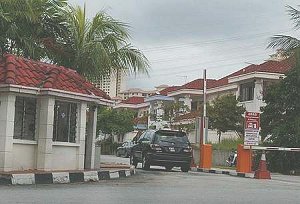Debate continues on gated
community
28/08/2004 The Star By K.W. MAK
MUCH has been said about the pros and cons of
gated communities recently. Although some people view such
neighbourhoods as “elitist” or a form of social apartheid, to some
others, particularly those who can afford it, the rising crime rate
has made it a necessity of sorts.
Are gated communities a practice of separating or
segregating groups and would their existence erode community ties?
Mah Sing Group Bhd chief executive officer Lim
Ching Choy said gated communities started out of concern for
security which led residents in some neighbourhoods to engage
security guards and deploy surveillance systems to deter crimes such
as robberies and break-ins.
“The number of houses in such communities are
usually below 300 units to allow easy control of security and
management,” said Lim.
The tight security means that visitors may be
delayed or even barred from entering the neighbourhood without
proper identification and approval from the residents to be visited.
Such measures to restrict access is the reason why
gated communites are deemed elitist.
 |
|
The security post guarding the entrance
and exit of a gated community in PJU 3/26 in Petaling
Jaya.
|
However, Lim defended the concept, saying: “You
have to look at the buyers of such homes and their needs.
“Many of our customers are frequent travellers or
parents who are at work most of the time and would like to provide a
safe environment where their children can play without fear.
“With much of their time spent elsewhere, it is
only prudent for them to want extra security for their homes where
their loved ones are.”
As for social integration within the community,
Lim said this could be easily arranged by engaging a good management
company to organise social events for residents.
But then this only increases the cost of living in
these secured neighbourhoods.
Even if they may not live in fear or crimes,
resident of gated communites (like those in condominiums) face their
share of problems when they don’t see eye to eye with the management
of their estate.
For the Crescent Court apartments in Brickfields,
problems with management led to the breakdown of all six lifts,
unpaid water bills and maintenance problems.
Residents had to take matters into their own hands
by ousting the previous management company to set things right.
In most cases, some residents would accuse
management of unsatisfactory services and withhold payment while the
management would respond by halting all services until the
defaulting residents pay up.
“There is no legal framework with regards to gated
communities or even condominiums,” said Lim.
“Hence newer gated communities require buyers to
sign a deed of mutual governance, which binds them to pay the
maintenance cost while the management is required to be accountable
for the maintenance.”
Open communities on the other hand face the
problem of crime and it doesn’t necessarily make these communities
come any closer together.
Many areas in southern Petaling Jaya do not have
community voluntary bodies like Rukun Tetangga (RT) or residents’
association (RA) to organise activities to bring everyone together.
Even communities with RT centres such as Section
17 and Section 14 face difficulty in uniting residents.
In the case of the two areas, this is largely due
to the fact that a segment of the residents are students and rent
payers who don’t feel they are part of the community, making it
difficult to mobilise a large section of the residents.
To foster community spirit, residents need to
volunteer their time and services to the community.
While this can be difficult with working adults,
there are success stories of communities coming together, like in
Section 6, Kota Damansara, where low-cost apartments, middle-cost
housing and bungalows are located side by side.
The community is testament to what can be achieved
through co-operation.
Together, they have turned vacant plots into fruit
orchards and organised kenduri events where most of the
residents contributed in both cash and manpower.
Other areas include Damansara Jaya (SS21), Section
4A and Bandar Sri Damansara where residents have formed their own RA
and RT, respectively, to serve the community and be the voice of the
residents when dealing with the local council.
Taman Mayang Jaya RA chairman Liew Wei Beng felt
that gated communities should not be encouraged, even though it had
become a selling point for many property developers.
“Just because the police don’t have enough
manpower to patrol areas, this is not the way to solve the problem.
“Gated communities don’t just isolate people, they
create an unhealthy image that the people staying there are of a
better class than those in open communities,” said Liew.
“Open communities should be encouraged because you
allow people to travel in and out without barriers, and it has
always been that way.
“There are no commercial areas in gated
communities, depriving residents the benefit of doing their daily
chores like buying groceries in the neighbourhood.
“Residents don’t even get the chance to chat over
coffee at nearby coffee shops
“Without such goings-on in a neighbourhood,
residents won’t even meet each other on the street.
“Everyone will be doing their own thing. At a time
when RAs and RTs are trying to get together with cross-border
activities, gated communities will be left out because of their
strict security,” said Liew.
|